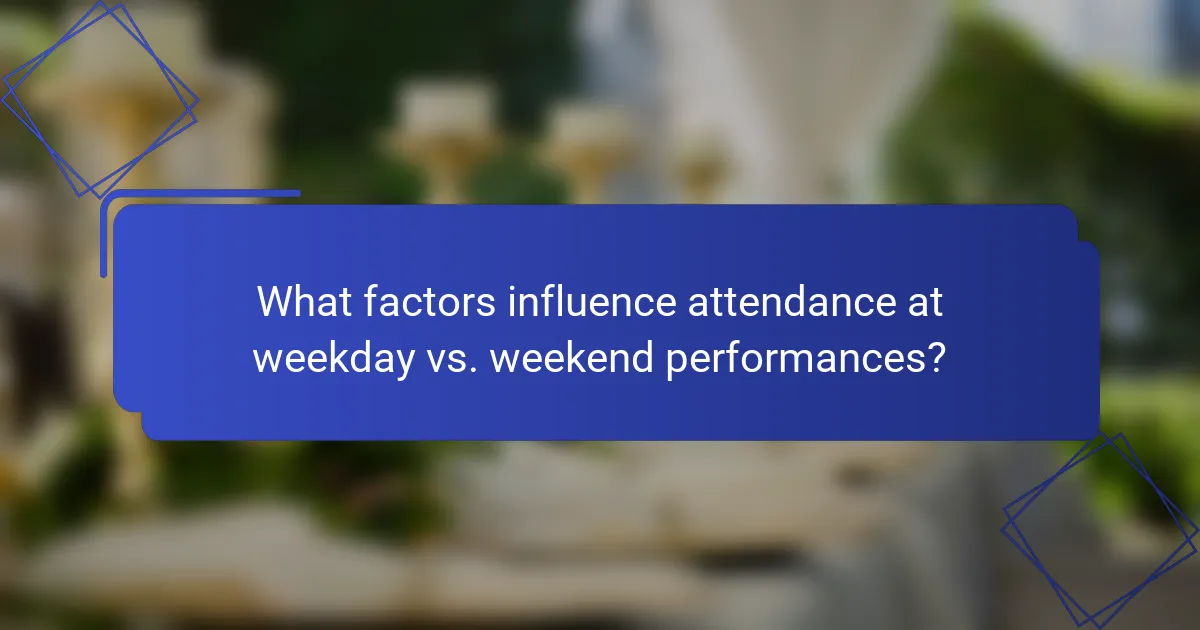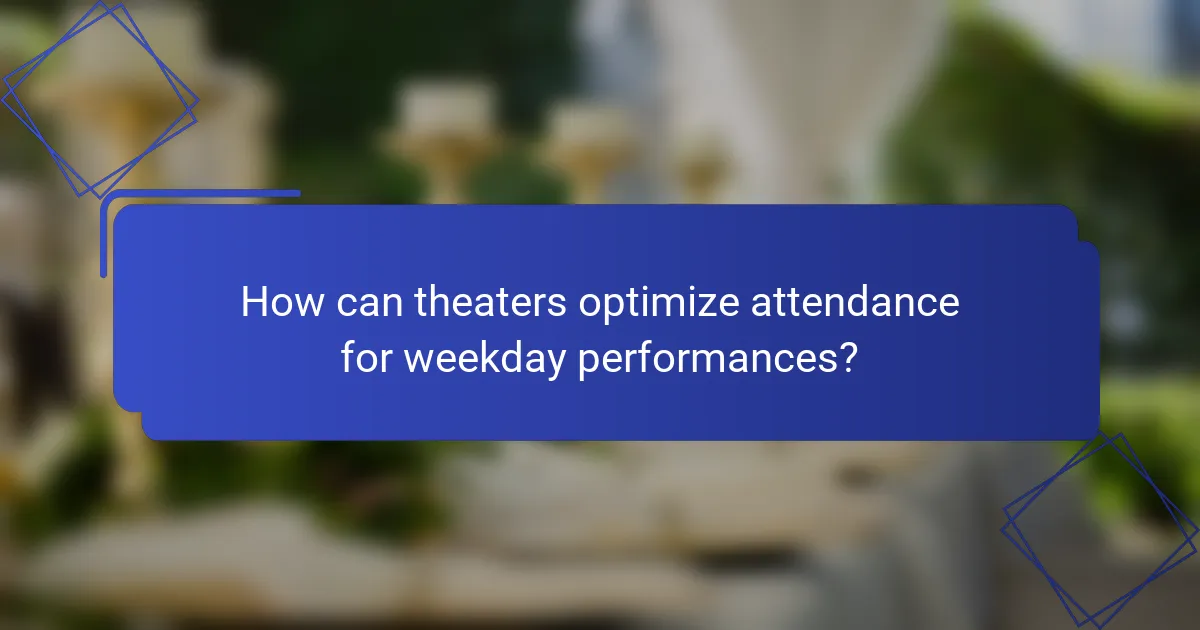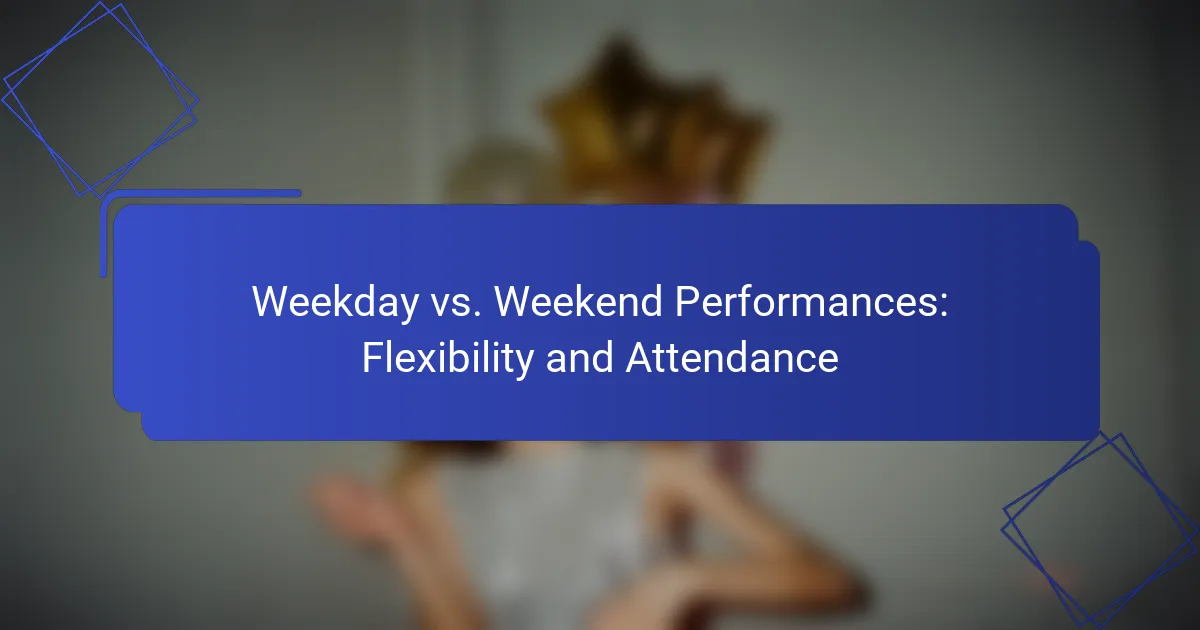The distinction between weekday and weekend performances plays a crucial role in attendance rates and audience engagement. Weekday shows often attract fewer patrons due to work commitments and scheduling preferences, while weekends typically see a surge in attendance. By analyzing these patterns, theater organizers can tailor their programming and marketing strategies to maximize audience turnout and profitability.

How do weekday performances compare to weekend performances in major cities?
Weekday performances typically see lower attendance compared to weekend shows in major cities. This difference is influenced by various factors, including audience availability, scheduling preferences, and pricing strategies.
Higher attendance on weekends
Weekend performances generally attract larger audiences, often filling venues to capacity. Many people prefer to attend shows on Fridays, Saturdays, and Sundays when they have more free time, resulting in higher ticket sales and revenue for theaters.
This trend is particularly evident in major cities where cultural activities are abundant, and weekend events are often marketed more aggressively. For example, a popular musical might see attendance rates increase by 30-50% on weekends compared to weekdays.
Weekday performances attract niche audiences
While weekday performances may have lower overall attendance, they often cater to specific niche audiences. These shows can attract individuals who have flexible schedules, such as retirees, students, or professionals with unconventional work hours.
Additionally, weekday performances may feature unique themes or experimental works that appeal to dedicated theatergoers. This can create a more intimate atmosphere, allowing for deeper engagement with the material.
Different pricing strategies
The pricing strategies for weekday and weekend performances can vary significantly. Weekday shows often offer discounted tickets to encourage attendance, making them more accessible to a broader audience.
Conversely, weekend performances may command higher prices due to increased demand. Some theaters implement dynamic pricing, adjusting ticket costs based on anticipated attendance levels, which can lead to substantial price differences between weekdays and weekends.

What factors influence attendance at weekday vs. weekend performances?
Attendance at performances varies significantly between weekdays and weekends due to several key factors, including work schedules and leisure activities. Understanding these influences can help organizers optimize their programming and marketing strategies.
Work schedules impact weekday attendance
Weekday performances often face lower attendance because many individuals have traditional work commitments that prevent them from attending. Most people work standard hours, typically from 9 AM to 5 PM, making it challenging to attend evening shows during the week.
To improve weekday attendance, organizers can consider scheduling performances earlier in the evening or offering incentives such as discounted tickets or special promotions. Targeting local businesses for group sales can also help fill seats on weekdays.
Weekend leisure activities draw larger crowds
Weekends generally attract larger audiences because people have more free time and are often looking for entertainment options. Many individuals use weekends for leisure activities, including dining out, attending events, or spending time with family and friends.
Organizers can capitalize on this trend by scheduling major performances on Friday or Saturday evenings when attendance is likely to be highest. Additionally, incorporating pre-show events, such as meet-and-greets or themed activities, can enhance the overall experience and draw in larger crowds.

What are the benefits of weekday performances for theaters?
Weekday performances offer theaters several advantages, including reduced competition for audience attention and the potential for discounted ticket pricing. These factors can enhance attendance and improve overall profitability for theater productions.
Lower competition for audience attention
Weekdays typically see fewer entertainment options compared to weekends, which means theaters can attract audiences more easily. With less competition from other events, such as concerts or sports games, theaters can focus on drawing in patrons who may be looking for a midweek outing.
This lower competition can lead to a more engaged audience, as attendees are often more willing to explore new shows or genres when fewer alternatives are available. The result can be a more intimate and enjoyable experience for both the audience and performers.
Opportunity for discounted ticket pricing
Theaters often take advantage of weekdays by offering discounted ticket prices to boost attendance. This pricing strategy can attract budget-conscious patrons who might not otherwise attend a performance. Discounts can range from a small percentage to significant reductions, making theater more accessible.
Additionally, promotional deals such as “two-for-one” tickets or special pricing for students and seniors can further incentivize attendance. By strategically pricing weekday performances, theaters can fill seats while still maintaining a healthy revenue stream.

What are the challenges of scheduling weekday performances?
Scheduling weekday performances often presents challenges such as limited audience availability and potentially lower revenue. These factors can significantly impact attendance and overall financial success.
Limited audience availability
Weekday performances typically face reduced audience availability due to work and school commitments. Many individuals are occupied during standard business hours, making it difficult for them to attend events in the evening.
To mitigate this issue, consider scheduling performances later in the evening or targeting specific demographics, such as retirees or students, who may have more flexible schedules. Marketing efforts can also focus on promoting the event as a unique weekday outing.
Potentially lower revenue
Weekday performances often generate lower revenue compared to weekend shows, primarily due to decreased attendance. This can lead to challenges in covering production costs and achieving profitability.
To enhance revenue potential, consider offering discounted tickets or special promotions for weekday events. Additionally, bundling performances with dining options or local attractions can create more appealing packages for potential attendees.

How can theaters optimize attendance for weekday performances?
Theaters can enhance attendance for weekday performances by implementing strategic marketing initiatives and forming partnerships with local businesses. These approaches can attract diverse audiences and create a more engaging experience for attendees.
Targeted marketing campaigns
To boost attendance on weekdays, theaters should develop targeted marketing campaigns that resonate with specific demographics. For example, promoting discounted tickets for students or seniors can encourage these groups to attend shows during less popular times.
Utilizing social media platforms to reach local audiences is essential. Theaters can create engaging content that highlights upcoming weekday performances, potentially increasing visibility and interest. Consider using targeted ads to reach users based on their interests and location.
Partnerships with local businesses
Forming partnerships with local businesses can create mutually beneficial opportunities that drive attendance. For instance, collaborating with nearby restaurants to offer dinner-and-show packages can entice patrons to make an evening out of their theater visit.
Additionally, theaters can engage with local organizations and schools to promote group outings. Offering special rates for bulk ticket purchases can encourage these groups to attend weekday performances, increasing overall attendance and community involvement.

What are the emerging trends in performance scheduling?
Emerging trends in performance scheduling indicate a shift towards greater flexibility and adaptability in showtimes, catering to diverse audience preferences. This evolution reflects a growing recognition of the need to accommodate varying schedules and enhance attendance rates.
Increased flexibility in showtimes
Increased flexibility in showtimes allows venues to offer performances at various times throughout the week, including weekdays and weekends. This approach helps attract different demographics, such as families during weekends and professionals on weekday evenings.
For example, some theaters now provide matinee shows on weekdays to capture audiences who may prefer daytime outings. Offering multiple time slots can lead to higher attendance rates, as patrons can choose times that best fit their schedules.
Hybrid performances combining live and virtual attendance
Hybrid performances that combine live and virtual attendance are becoming increasingly popular, allowing audiences to engage in ways that suit their preferences. This model enables people to attend in person or watch from home, broadening the reach of performances.
For instance, a concert might sell tickets for a live audience while also streaming the event online for those unable to attend physically. This flexibility not only enhances accessibility but also allows venues to maximize ticket sales and audience engagement.


